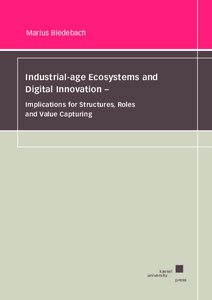| dc.date.accessioned | 2023-04-17T15:02:25Z | |
| dc.date.available | 2023-04-17T15:02:25Z | |
| dc.date.issued | 2023 | |
| dc.identifier | doi:10.17170/kobra-202303217671 | |
| dc.identifier.uri | http://hdl.handle.net/123456789/14587 | |
| dc.description | Zugleich: Dissertation, Universität Kassel, 2023 | ger |
| dc.language.iso | eng | |
| dc.publisher | kassel university press | ger |
| dc.rights | Namensnennung - Weitergabe unter gleichen Bedingungen 4.0 International | * |
| dc.rights.uri | http://creativecommons.org/licenses/by-sa/4.0/ | * |
| dc.subject | Digital innovation | eng |
| dc.subject | Ecosystems | eng |
| dc.subject | Digital Transformation | eng |
| dc.subject | Incumbent Firms | eng |
| dc.subject | Automotive | eng |
| dc.subject.ddc | 330 | |
| dc.title | Industrial-age Ecosystems and Digital Innovation | eng |
| dc.type | Buch | |
| dcterms.abstract | The widespread diffusion of digital technology increasingly affects traditional contexts. As a result, established industries and ecosystems are required to implement digital innovation. Hence, the demand for digital capabilities in established industrial-age ecosystems is growing, which might be served by IT-enabled actors that are particularly well-suited to provide these capabilities. However, first, the implications for industrial-age ecosystems in established contexts, where the force of digital innovation collides with institutionalized industry structures, are unclear. Second, there is a lack of knowledge regarding the impact of digital innovation on incumbent firms in industrial-age ecosystems. To address these gaps, the dissertation provides insights of four individual studies on the impact of digital innovation on industrial-age ecosystems and incumbent organizations. In particular, the dissertation focuses on three objectives: first, understanding the change of established ecosystems due to emerging digital innovation, second explaining the implications of growing digital innovation brought by IT-enabled actors for structures and actor composition, and third assessing outcomes for incumbent firms within these ecosystems. The findings underline the widespread implication of pervasive digital technologies and digital innovation on industrial-age ecosystems of established contexts. These ecosystems undergo distinct periods of change, while IT enabled actors are increasingly responsible for reshaping existing structures, demonstrating their power across contexts. Moreover, findings reveal that incumbent organizations might not be threatened by a digital disruption due to the aforementioned developments. They rather benefit from IT-enabled actors entering the scene. According to the findings, the dissertation derives valuable implications for research and managerial practice. | eng |
| dcterms.accessRights | open access | |
| dcterms.creator | Biedebach, Marius | |
| dcterms.extent | IX, 217 Seiten | |
| dc.contributor.corporatename | Kassel, Universität Kassel, Fachbereich Wirtschaftswissenschaften | ger |
| dc.contributor.referee | Hanelt, André (Prof. Dr.) | |
| dc.contributor.referee | Schneider, Sabrina (Prof. Dr.) | |
| dc.publisher.place | Kassel | ger |
| dc.relation.isbn | 978-3-7376-1106-0 | |
| dc.subject.swd | Ökosystem | |
| dc.subject.swd | Kraftfahrzeugindustrie | ger |
| dc.subject.swd | Digitalisierung | ger |
| dc.title.subtitle | Implications for Structures, Roles and Value Capturing | eng |
| dc.type.version | publishedVersion | |
| kup.iskup | true | |
| kup.price | 34,00 | |
| kup.subject | Wirtschaftswissenschaft | ger |
| kup.typ | Dissertation | |
| kup.institution | FB 07 / Wirtschaftswissenschaften | ger |
| kup.binding | Softcover | |
| kup.size | DIN A5 | |
| ubks.epflicht | true | |



